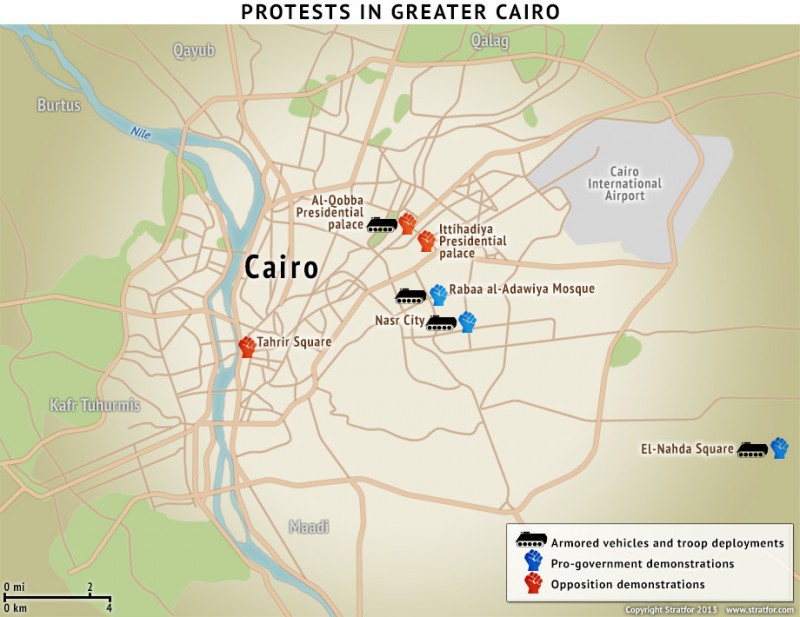Analysis
A debate is underway in Egypt on whether the move to oust President Mohammed Morsi is tantamount to a military coup. Considering that the Egyptian army is forcibly removing a democratically elected president in the wake of nation-wide unrest, the military intervention is indeed a coup. However, it differs from other coups in that direct military rule will not be imposed.
There is considerable public support for Morsi’s removal, so the provisional authority that will replace him likely will be a broad-based entity that includes representatives of the nation’s main political stakeholders. Indeed, the interim government likely will differ greatly from the one run by the Supreme Council of the Armed Forces, which governed the state after former President Hosni Mubarak was forced from office in 2011 and until Morsi came to power in June 2012.
Herein lies the problem of the Egyptian military, which has been the mainstay of the regime since the founding of the modern republic in 1952. For most of its history, especially since after the end of the 1967 war, Egypt’s military has never directly governed the country; rather, it ruled from behind the scenes, except for the year when the Supreme Council of the Armed Forces ruled. Until the fall of Mubarak, this was achieved by means of single-party rule where the now-disbanded National Democratic Party administered at the behest of the military. The destruction of the National Democratic Party was a major dilemma for the military, which no longer had a civilian partner. This was further complicated by the onset of a multi-party era.
As the single largest, most coherent political force in the country, Morsi’s Muslim Brotherhood was able to benefit from the electoral process. With the election of Morsi as president last year, it appeared as though the military had found a replacement of sorts for the National Democratic Party — the ideological differences notwithstanding. What the military needed was a government that could manage the political economy of the country such that the state of unrest could remain limited.
Morsi’s government failed to do that. His focus on consolidating power for his group is what triggered the current massive public backlash. As a result, the army is once again without a civilian partner. There are no alternatives to the Muslim Brotherhood because the opposition is a large protest movement without any coherent core. However, it is notable that the impetus for these protests was the liberal and secular opposition, who for the first time demonstrated an ability to establish a united front. It is unclear whether the opposition will coalesce and whether Tamarod’s political wing, June 30 Front, represents a political alternative to the Brotherhood’s established social networks in the country. Mohammed ElBaradei’s appointment as the negotiator for much of the opposition could be a first step toward a political entity besides the Brotherhood that could wield civilian power.
The unrest generated by the opposition elements united under Tamarod, and to a lesser extent even among some Islamists, has forced the military to get rid of the Morsi presidency. After all, the president refused to resign, and the opposition would not accept his proposals for a compromise. But this is not the outcome the military preferred. It hoped Morsi could maintain control of the country while securing the military’s economic and political interests.
But the massive public outcry and the Brotherhood’s defiant stance left the military with no option but to follow through on its threat to remove the president. The outcome is not just the removal of a government; it is the collapse of a burgeoning democratic system. Furthermore, the forcible removal of the Morsi government will make it difficult to create a new civilian government because the political environment will be even more polarized. The move has no doubt angered the Muslim Brotherhood, which we expect to push back dramatically. But just as important, the military has set a precedent for giving in to mob violence.
Morsi’s downfall shows that the army’s decades-long strategy of ruling without governing is proving increasingly difficult to impose. It cannot impose military rule because doing so would only aggravate tensions. It also shows that the country needs a coalition government. Such a government would be extremely difficult to create. Even though Egypt is constrained by the different factions and pressures in the country, the military remains the ultimate source of power in the country.











































